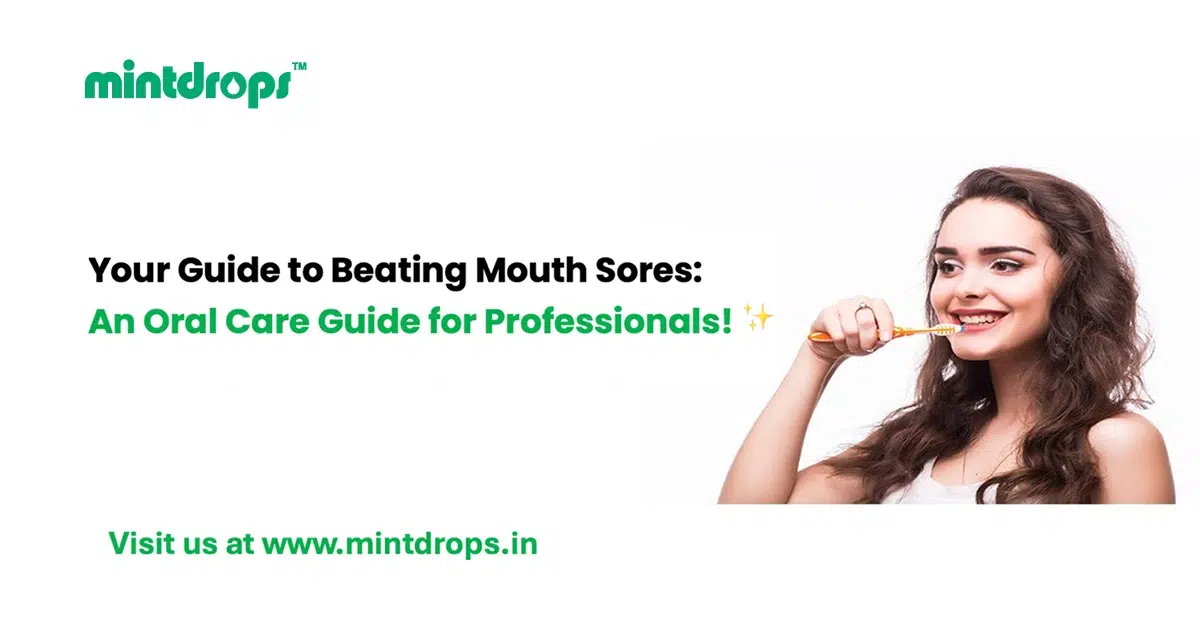Hey everyone! Have you ever taken a sip of your morning coffee and winced because of a little sore in your mouth? That feeling is more than just annoying. For millions of professionals, these oral health issues can quietly mess with your productivity, your confidence, and how you feel all day.
Whether it’s a tiny canker sore, a painful ulcer, or that constant feeling of inflammation, understanding what’s going on is the first step to feeling better. In our fast-paced work lives, taking care of our mouth is more important than ever.
What’s Happening with Our Mouths at Work?
Did you know that over 70% of working professionals deal with some kind of oral discomfort every year? The modern workplace, with its unique challenges, creates a perfect storm for mouth problems.
Types of Mouth Sores and Ulcers Let’s quickly understand what we’re talking about here. Knowing the name of the problem is the first step to fixing it!
- Canker Sores: These are small, round sores that are white or yellow in the middle with a red border. They usually pop up on the inside of your cheeks or lips.
- Cold Sores: These are actually caused by a virus. They show up as tiny, fluid-filled blisters around your lips.
- Sores from Injury: Sometimes you just bite your cheek by accident or brush too hard. That can cause a painful spot to show up.
- Chronic Inflammation: This is when your gums, tongue, or other mouth tissues feel constantly swollen or irritated.
The Hidden Reasons for Your Mouth Woes
So, what’s really going on? The reasons for these problems might be closer to your daily life than you think.
- Stress at Work Let’s face it: our jobs can be stressful! And that stress doesn’t just affect our minds, it affects our bodies.
- Weakened immune system: When you’re stressed all the time, your body makes a hormone called cortisol. This can weaken your immune system, making it easier for infections and sores to pop up.
- More inflammation: Stress can cause inflammation all over your body, including your mouth.
- Teeth grinding: When we’re under pressure, we often clench our jaw or grind our teeth, which can cause little injuries in your mouth.
- Less saliva: Stress can dry out your mouth. Saliva is your mouth’s natural defence system, so when there’s less of it, you’re more exposed to problems.
- Your Professional Diet The way we eat at work can also cause problems. Think about it:
- Too much coffee: All that caffeine can lead to a dry mouth and make it more acidic, which isn’t good for your teeth or gums.
- Processed snacks: High-sugar snacks are everywhere in offices. That sugar feeds the bad bacteria in your mouth.
- Skipping meals: Irregular meal times can throw off your mouth’s natural balance.
- Not enough water: We’re often so busy we forget to drink water! Staying hydrated is key to having enough saliva to keep your mouth healthy.
How to Get Relief & Stay Healthy for Good
Getting rid of a sore is one thing, but preventing it from coming back is the real goal. As Dr. Michael Chen, a dental expert, says, “Effective oral care requires a multi-faceted approach that addresses both immediate symptoms and underlying causes.”
Quick Relief for Sores and Ulcers If you have a sore right now, here are some quick ways to get some comfort:
- Antimicrobial Rinses: Use a special mouth rinse that helps kill germs and bacteria.
- Pain-Relieving Gels: You can use gels with things like benzocaine to numb the area for a little while.
- Protective Patches: Some patches stick to the sore and protect it from getting irritated while it heals.
- Natural Support: Try using natural anti-inflammatory things like aloe vera gel or a mouth rinse with turmeric.
Long-Term Prevention for a Healthy Mouth To really get ahead of the problem, you need a plan.
- A Daily Routine: Have a good daily oral care routine with products that work for you.
- Manage Your Stress: Find ways to de-stress. Try meditation, going for a walk, or doing some deep breathing exercises. This helps your whole body.
- Eat Smart: Focus on foods with lots of vitamins like B12, folate, zinc, and iron. These are like fuel for your mouth’s health.
- Regular Check-ups: Don’t skip your dentist appointments! Regular visits can catch problems before they become serious.
When to See a Professional
Sometimes, a sore is more than a simple annoyance. You should talk to a professional if you see any of these signs:
- A sore that lasts for more than two weeks.
- Ulcers that keep coming back every month or so.
- Pain is so severe that it’s hard to eat or talk.
- Any signs of a serious infection like a fever or swollen lymph nodes.
Your Oral Health Journey Starts Today!
Don’t let oral health issues get in the way of your professional performance or personal well-being. The statistics are clear: 73% of professionals report oral discomfort during high-stress times, and early action can reduce treatment costs by a lot.
Ready to take control of your oral health?
Please visit https://mintdrops.in to explore natural oral care products and begin your journey toward improved oral health. Both your well-being and professional life may benefit from this decision.


